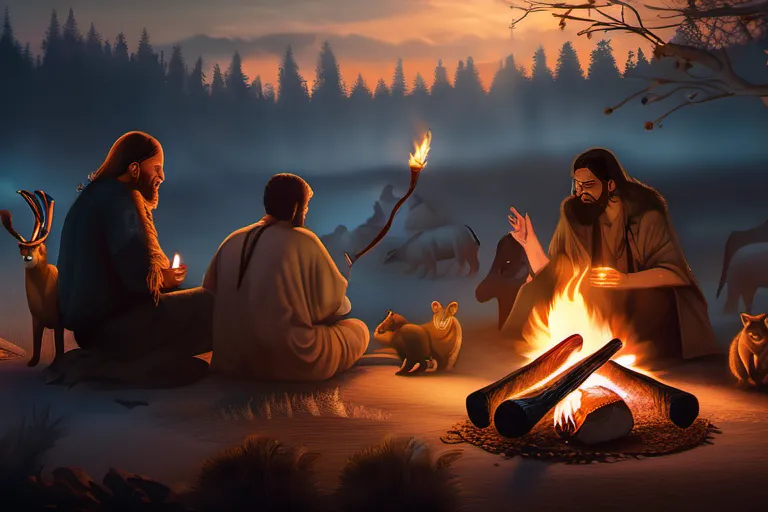Exploring the roots, characteristics, and evolution of the earliest religious beliefs
Delve into the fascinating world of ancient religions as we uncover the origins and defining features of the first religion on earth. From animism to polytheism, we’ll explore various belief systems that have shaped human history.
The Emergence of Religious Beliefs
Imagine peering into the distant past, when humanity’s first forays into understanding their place in the world were as raw and unfiltered as the dawn itself. How did religious beliefs come to be? What were the early humans seeking that led them to weave stories of gods and spirits, imbuing every rock and stream with a sense of awe and fear?
Fear played a pivotal role in the emergence of these earliest religions. Could it have been the thunderous crash of lightning that sent shivers down our ancestors’ spines? Or perhaps the sudden, inexplicable illness that left them questioning their existence? These primal fears, etched deeply into our collective consciousness, drove early humans to seek solace and explanations in the supernatural.
Awe also had a significant part to play. Picture standing amidst a towering forest or witnessing a celestial event like a solar eclipse. The sheer magnitude of nature’s grandeur could not be explained by simple human understanding—could it? It was this sense of wonder that led early humans to see the world as more than just matter and energy, but as a complex tapestry woven with threads of divinity.
The need for explanation was another crucial factor. In a world filled with mysteries that we could not understand or control, how did our ancestors grapple with these questions? By creating stories and myths, they wove together a narrative of cause and effect, good and evil, life and death. These tales served as a framework to organize their experiences and provide meaning in an otherwise chaotic existence.
Thus, the first religions on earth were born from a blend of fear, awe, and the insatiable human desire for understanding. They were not just about worship or reverence; they were complex systems that helped early humans navigate their world, making it more comprehensible and less daunting.
Animism: The First Religion?
Have you ever paused to wonder about the very first religion on Earth? How did people from the earliest times begin to define their relationship with the world around them? One of the earliest known belief systems, animism, offers a fascinating insight into these beginnings.
Imagine stepping back in time to an era before organized religions took shape. In those days, every rock, tree, and stream was imbued with life and spirit. This is what animism is all about: the belief that everything has a soul or spirit. How did such a concept arise? It’s as if the world itself whispered these ideas into human ears, prompting early humans to see the divine in every element of nature.
Consider this: before written language, how did our ancestors make sense of their surroundings? They turned to the spirits of plants and animals, seeking explanations for phenomena that often seemed beyond their understanding. This perspective wasn’t just a belief; it was a way of life, where rituals and practices were woven into daily existence. Every action had consequences in this interconnected web of living forces.
Think about how animism acted as the bedrock upon which more structured religions later built. Its emphasis on the sacredness of nature laid down a fundamental respect for the environment that still resonates today. Even as other forms of religion emerged, this reverence for the natural world remained a cornerstone of many belief systems.
Animism also provided a framework for understanding the cycles of life and death. In a world where human lifespans were much shorter than they are now, animism offered comfort through the concept of spirits. These spirits could still influence the lives of the living, bridging the gap between the known and unknown.
So, as we explore further into religious history, remember that animism wasn’t just a belief; it was a way of seeing the world. It shaped the very fabric of human societies, setting the stage for more complex forms of spirituality to evolve. In many ways, every religion that followed can trace its roots back to this foundational concept.
Polytheism: Multiple Deities and Beliefs
Polytheism, the belief in multiple deities, was one of the earliest and most widespread religious systems on earth. Could it be that these complex pantheons held a mirror to the human condition, reflecting our fears, desires, and aspirations? Imagine a world where every aspect of life—from the crops that grow in the fields to the stars that light up the night sky—was overseen by its own divine entity. This is the essence of polytheism, where gods and goddesses are not just abstract concepts but tangible presences in daily life.
These deities often had distinct roles and personalities, much like the human beings who worshipped them. For instance, in ancient Greece, Apollo, the god of music and poetry, was revered for his artistic talents, while Hera, the queen of gods, embodied marital fidelity and family life. Each deity represented a facet of existence, from fertility to war, making polytheism a rich tapestry woven through the threads of human experience.
The evolution of these beliefs over time is fascinating. As civilizations grew more complex, so did their pantheon of gods. The Egyptians, for example, had hundreds of deities that formed a hierarchical structure, with Ra, the sun god, at the pinnacle. Similarly, the Romans adapted and incorporated various Greek gods into their own religion, creating a diverse array of divine beings.
The impact of polytheism on human culture is profound. Festivals, rituals, and ceremonies were central to daily life, fostering community bonds and providing explanations for natural phenomena. However, it also posed challenges: how do you navigate the complex relationships between different gods and ensure their favor? This intricacy made religious practices deeply personal and profoundly influential.
Ultimately, polytheism set the stage for future religious developments by exploring themes of divinity, ethics, and spirituality in ways that resonated with people across cultures. Its influence can still be felt today, not only in ancient traditions but also in modern mythologies and storytelling. How do you think polytheism influenced your own understanding of religion and belief?
Monotheism: The Rise of a Single God
As we delve into the origins and definition of the first religion on earth, we find ourselves at the cradle of monotheism—the belief in one single god. Is it any wonder that this concept seemed revolutionary to ancient civilizations? How did a singular deity rise from the chaos of polytheistic beliefs? The answer lies in monotheism: the belief in one all-powerful, all-knowing, and often transcendent god.
Monotheism emerged as a response to the complexities and contradictions inherent in polytheistic systems. Imagine a world where every aspect of life was attributed to a different deity—storms had gods, crops had gods, love had gods. It must have seemed overwhelming for people trying to navigate their existence with so many deities to appease.
But what if there were just one god who controlled it all? This idea brought simplicity and unity to religious practices. Wasn’t it more logical that a single, omnipotent being could oversee the entire universe? The shift towards monotheism represented a profound intellectual leap, transforming how humans viewed their relationship with divinity.
The emergence of Judaism, one of the earliest known forms of monotheism, offers a fascinating glimpse into this evolution. Its foundational texts, like the Torah, present a narrative where Yahweh, the one true god, interacts directly with his chosen people. This direct communication challenged the traditional pantheon system and set the stage for future monotheistic religions.
As we explore further, it becomes clear that monotheism didn’t just change religious practices; it reshaped societies. The idea of a single god often implied ethical standards and moral codes that transcended cultural boundaries. Could it be that by believing in one god, people were also embracing a shared sense of morality?
The rise of monotheism marked the beginning of a new era in human history—one where the concept of god became more abstract and less tied to specific cults or rituals. This transition paved the way for religions like Christianity and Islam, which continue to influence global culture, politics, and ethics today.
As we move forward in our exploration, it’s crucial to understand that while monotheism brought clarity, it also introduced its own complexities. The concept of a single god raised questions about the nature of divine justice, free will, and the existence of evil. These discussions have persisted throughout history, shaping the evolution of religious beliefs.
The Evolution of Religious Beliefs
Imagine stepping back through time, to the very dawn of human history. What would be the first religion on earth like? Would it have been a simple, primal belief in the forces of nature, or something more complex and structured? The origins of the first religion are shrouded in mystery, but we can piece together fragments of what life might have looked like during those early days.
Consider the environment as a canvas upon which these earliest religious beliefs were painted. In the arid deserts, where water was scarce and survival depended on every drop, people might have worshipped rain gods, believing they could influence the fickle skies. Meanwhile, in the lush jungles of Southeast Asia, fertility and abundance might have been revered, as nature teemed with life. Each culture, shaped by its environment, crafted its own unique religious narratives.
How did these early religions interact with each other? Were they isolated, or did ideas dance between communities, leading to a gradual exchange of deities and beliefs? The movement of peoples—whether through trade routes or forced migrations—likely played a significant role in the spread and evolution of religious practices. These movements were not unlike rivers, carving paths that connected distant lands and peoples.
The evolution of religious beliefs is intrinsically linked to cultural development. As societies grew more complex, so did their spiritual practices. The emergence of agriculture, for instance, brought about a new set of challenges and blessings, prompting people to offer prayers for good harvests and protection from pests. This agricultural revolution didn’t just change how people lived; it also transformed their religious beliefs.
Historical events, too, left an indelible mark on early religions. Wars, plagues, and natural disasters often led to profound spiritual transformations. In the face of such calamities, people sought answers in their gods, leading to a more structured approach to worship and ritual. These events were like powerful storms, reshaping the landscape of religious thought.
The evolution of early religions was not a solitary journey but a conversation, a dialogue between beliefs, practices, and experiences. Each religion was both a product of its time and a catalyst for change, setting the stage for the complex religious tapestry we see today. As we trace this evolution, we find that the roots of our own belief systems are intertwined with those first, ancient voices.
The Legacy of Early Religions
How did the very first religion come into being, and what was its defining characteristic? The origins of early religions are shrouded in mystery, much like the dawn that marks the beginning of a new day. Imagine a world where every rock, tree, and river had a spirit or a divine presence—this is the essence of the earliest religious beliefs.
These ancient faiths were not just about worship; they were integral to daily life. They explained natural phenomena, provided moral guidance, and offered solace in times of need. How could such beliefs have emerged? Were humans born with these notions, or did they evolve through a process of trial and error?
The first religions often revolved around the concept of nature deities, which mirrors our modern understanding of how early societies interacted with their environment. These gods were personifications of natural forces like rain, wind, and sun. By worshipping these entities, early humans sought to influence their fate, much like we might ask for good weather when planning an outdoor event.
One could argue that the earliest religions were a form of primitive science, where rituals and ceremonies attempted to understand and control the unknown. But how do we define this first religion? Was it polytheistic, with multiple gods representing different aspects of nature, or did it have a single supreme being?
The answers to these questions are as elusive as they are intriguing. The legacy of early religions is profound, shaping our current belief systems and cultural practices. Whether through the worship of ancient deities or modern spiritual movements, we carry forward the threads of these earliest religious beliefs. In many ways, the origins of religion on Earth are a testament to humanity’s quest for meaning and connection in an otherwise chaotic world.
Conclusion
 By understanding the foundations of our earliest religious beliefs, we gain valuable insights into the development of human culture and society. Join us as we embark on this captivating journey through time.
By understanding the foundations of our earliest religious beliefs, we gain valuable insights into the development of human culture and society. Join us as we embark on this captivating journey through time.











